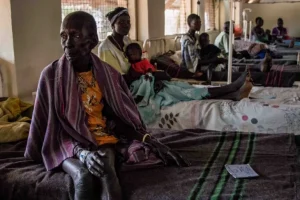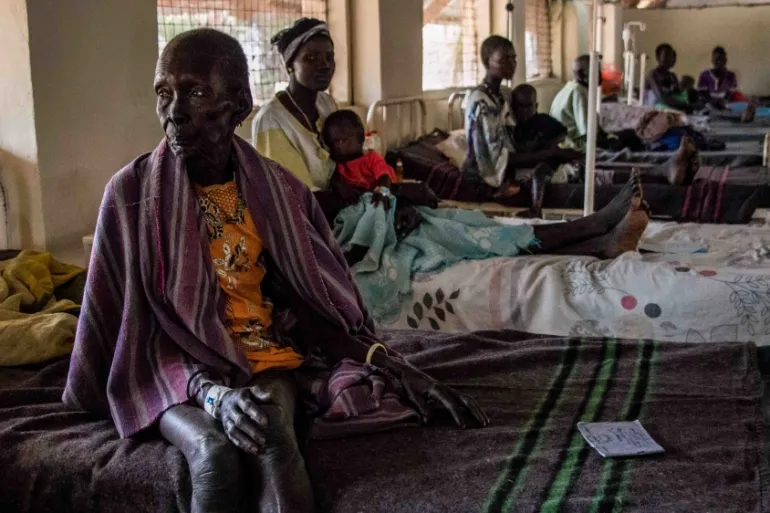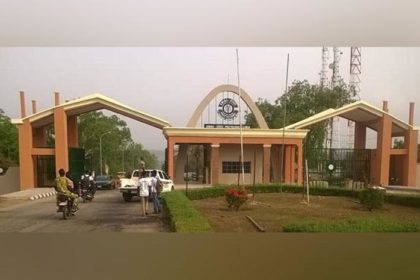
By Adeyemi Adekunle
South Sudan’s escalating cholera outbreak has triggered a massive vaccination campaign aimed at protecting millions from the deadly disease.
With over 199 lives lost and more than 13,000 cases confirmed since September, the government, backed by international partners, is racing against time to prevent further devastation. However, the operation is plagued by logistical challenges, worsening living conditions, and limited resources.
The disease struck its first victim in Renk, northeast of Juba, on September 23, quickly spreading to 29 of the country’s 79 counties. Worst hit are Bentiu, Renk, and Juba, where crowded refugee camps and poor sanitation have created a fertile breeding ground for cholera. The arrival of over 1.1 million doses of oral cholera vaccines has offered hope, but the task ahead remains daunting.
Health officials say they aim to vaccinate over 80% of the population, focusing on children and mothers. UNICEF’s Dr. Gabriel Boum Tap explains the urgency: “Cholera is a ruthless disease. Without vaccines, it spreads faster than we can control, claiming lives before healthcare systems can respond. The doses we’ve received are vital, but the demand is overwhelming.”
For many South Sudanese, the fight against cholera is personal. In Bentiu, 32-year-old Thinjin Khoat shared his heart-wrenching encounter. “I watched a 5-year-old child die because doctors couldn’t find a vein for treatment. He was so dehydrated. It was hopeless.” His story underscores the scale of the crisis in a country where access to healthcare is limited, particularly in flood-prone and conflict-ridden areas.
South Sudan’s geography and infrastructure amplify the challenges. Massive flooding has rendered entire regions unreachable, isolating communities most in need of medical attention. “In Bentiu, it’s a nightmare,” said Khoat. “Floodwaters have cut off roads, and the rising insecurity makes travel risky for both patients and healthcare workers. Many victims are left without help.”
The overcrowded refugee camps in Bentiu and Renk, home to tens of thousands displaced by conflict and famine, are particularly vulnerable. Stephanie Ngai, project coordinator for Doctors Without Borders (MSF), described the conditions as a “perfect storm” for a cholera outbreak. “The disease spread like wildfire. Local health systems are completely overwhelmed, and most partners lack adequate funding to scale up interventions.”
To tackle these challenges, the vaccination rollout has been divided among international health agencies. The World Health Organization (WHO) will lead efforts in flood-affected, hard-to-reach areas, while MSF will cover the crowded IDP camps and Bentiu town. Despite the coordinated approach, Ngai warns that underfunding and disjointed responses remain significant barriers.
Cholera, caused by consuming contaminated food or water, can lead to acute diarrhea, dehydration, and death within hours if untreated. Global estimates from WHO indicate that it kills 143,000 people annually out of an estimated 4 million cases. In South Sudan, children under 5 are particularly vulnerable.
The government, while acknowledging these obstacles, is determined to press forward. Unity State’s immunization program manager, Buok Danhier, emphasizes the urgency of vaccinating as many as possible. “In Rubkona, WHO and other partners will take on hard-to-reach areas, while MSF focuses on the town and IDP camps. We cannot afford to delay. Lives depend on it.”
However, cholera vaccination is only part of the solution. Without long-term measures to address the root causes—poor sanitation, inadequate access to clean water, and overcrowded living conditions—South Sudan remains vulnerable to future outbreaks. In many of the camps, people are forced to drink from contaminated water sources or share facilities with hundreds of others, leading to rapid disease transmission.
The ripple effects of the outbreak extend beyond public health. Families are facing mounting financial pressure as they struggle to afford treatment for their loved ones. “We’ve spent thousands on my sister-in-law, her husband, and their two children,” a distressed relative in Juba shared. “And there’s no guarantee they will recover fully. This disease has left us drained in every way.”
As international agencies ramp up their efforts, calls for stronger global support are growing. MSF, WHO, and UNICEF are urging donor governments to provide additional funding to bolster healthcare capacity in South Sudan. “The scale of this outbreak is unprecedented,” said Dr. Tap. “We need resources not just for vaccines but for better infrastructure and supplies to reach everyone affected.”
Despite the daunting challenges, the people of South Sudan remain resilient. For Khoat and countless others, the vaccination campaign is a beacon of hope in an otherwise bleak situation. “We’ve been through famine, floods, and war,” he said. “Now, it’s cholera. But we must keep fighting for our children and for our future.”
With the rollout set to begin next Monday(today), the stakes couldn’t be higher. Whether South Sudan can overcome the logistical and systemic hurdles to vaccinate its vulnerable population will be a defining moment in the fight against cholera—and a test of global solidarity. For now, communities hold their breath, praying that help will reach them before it’s too late.




